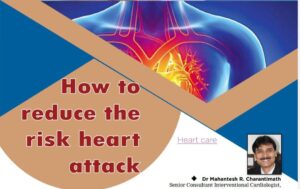Heart attack has become a major health problem. But Don’t lose heart. Even after a heart attack, one can lead a healthy and productive life. Taking preventive measures and avoiding the various risk factors, one can prevent further damage to the heart and prevent further heart attacks.


Heart is the seat of emotions especially love & devotion. It is the central place for life & existence. It’s just a hollow muscular organ located behind the sternum that pumps blood through blood vessels by repeated rhythmic contractions which supplies blood with oxygen & nutrients. Coronary arteries are vessels that supply the blood to the heart muscles. Heart block or decreased blood supply to arteries leads to Coronary Heart Disease (CHD).
The symptoms seen due to coronary ‘blocks’ are generally Chest pain technically known as (Angina Pectoris), heart attack (Myocardial Infarction),reduced pumping (Heart Failure) and may be sudden death due to cardiac arrest.
When there is an artery blockage, the blood supply to the heart stops causing heart attack, because heart needs regular supply of blood for its normal functioning.
Some of the tips to maintain healthy heart:
1. Healthy weight: It is necessary to maintain a balanced weight of our body. If you are overweight, it increases your risk of high blood pressure, high cholesterol levels, cardiovascular disease and diabetes.
2. Nutritious diet: Eat a nutritious diet every day, but limit fats and cholesterol. Pick fat-free or low-fat dairy products in your routine. As an alternative to solid fats like butter, practise monounsaturated oils like olive and peanut and polyunsaturated oils like sesame and sunflower.
3. Exercise regularly: To have a healthy heart it is advised to have physical activities. Exercise regularly for about 30 to 60 every day.
4. Omega-3s: Eat food which has omega-3 fatty acids, like fish, flax seeds, chia seeds, walnuts, eggs, yogurt etc.
5. Eat adequate fruits and vegetables: It is necessary to eat vegetables and fruits which has nutrients, potassium and antioxidants that protect against heart attack.
6. Don’t consume alcohol: It is to be noted that alcohol consumption raises BP, hence avoid consuming the same.
7. Minimise salt intake: Limiting salt in your diet and changing your lifestyle can help prevent high BP.
8. Avoid Smoking: One of the best way to protect yourself against heart attack is stop smoking.
Exercising for a healthy heart
Regular physical activity like walking or exercise may lower the danger of a heart attack. If you’re middle-aged or older and haven’t been exercising regularly or have a chronic health problem, consult your doctor.
Walk for 5-10 minutes every day, gradually increase the duration.
- Properly schedule your regular exercise, at-least 45 to 60 minutes in a day.
- Stretching, aerobic and strengthening are helpful, but it is to be remembered to maintain the intensity in each exercise session like warm-up, workout and then slow-down.
- Other exercise like swimming, bicycling, walking, gardening, climbing stairs or washing floors can burn calories and help improve your health, but don’t overdo it.
Tips for a heart-healthy diet
1. Use nonstick pans.
2. Bake, boil, steam or grill foods instead of frying them.
3. Try low-fat snacks that have been baked instead of fried
4. Eat fewer “fast foods” (burgers, fried foods), which are high in fat. Instead, eat more fruits, vegetables and carbohydrates (rice, pasta, breads).
5. Drink low-calorie beverages.
6. Eat less fat (ghee, butter, coconut/palm oil, cream, animal fats)
7. Choose low-fat dairy products, such as skimmed milk, and low-fat cheese.
8. Try to limit how many sweets you eat.
9. Avoid or restrict egg yolk
10. Buy lean cuts of meat, and eat fish, skinless chicken and turkey
Also read: The Covid-19 impact on heart – Heart patients must take extra care
Steps for prevention of heart attack
1. Smoking cessation
2. Blood pressure control
3. Good Blood sugar control
4. Weight management
5. Achieve recommended lipid levels
6. Regular Exercise / Diet / De-stress


Dr Mahantesh R. Charantimath
Senior Consultant Interventional Cardiologist
Tathagat Heart Hospital at Mallige Medical Centre premises
No. 31/32, Crescent Road, Bengaluru – 01
Phone : 080- 2235 7777 | 99003 56000
E-mail: mahanteshrc67@gmail.com
http://tathagathearthospital.com/











